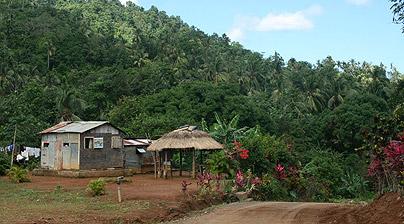Volume No. 2 Issue No. 42 - Monday June 9, 2008
The indigenous people and their place in Dominica
 Dr Emanuel Finn Dr Emanuel Finn


The Kalianago people live in one of the most bountiful places on earth.
|
Not too long ago there was an inherited ideology in Dominica about the backwardness and �otherness� of the Carib Indians. This way of thinking continued unabated for some time. In some quarters this unprogressive attitude towards our First Nation people are still being prevailed.
Also as a group and community, the Carib Territory is still one of the poorest on the island. They are also one of the most disrespected people as well in spite of their colorful culture, history and source of high revenue for the tourism industry.
This was made clear by (according to the Carib Chief and others) the unjustifiable execution style killing of a Carib man by the Dominica Police recently. Adding insult to injury, the way the police officers were dealt with by their superiors and court system speaks to the larger issue of the lack of fairness and justice for those who where on the island before the Africans and Europeans arrived. Carib autonomy and their place in their homeland is not just a political issue, but one that should be sorted out in the courts and civil society as well.
Given the debate surrounding the proposed ban of "mixed-blood" marriages among Dominica's Caribs, a whole bundle of very contentious ideas, provocations and if not ethnic and racial tensions may have risen as a result of the declaration by Carib Chief Williams. The chief�s position is that intermarriage should be a priority in order to preserve the dwindling population and purity and customs of his people.
This concept which probably have its merits, supporters and detractors but is not knew at all. My dad who grew up at the edge of the territory in Castle Bruce, always talked about the old Carib custom of when a Carib woman marries to a non Carib man, she had to follow the man to his village away from the territory. By his declaration, chief Williams may just be pushing that old custom out of frustration a bit further, given the fact that the pace of development and respect for his community and people by successive governments and the courts has been less than forthright.
Contributing to this long-standing syndrome of the otherness of the Carib people is the �lip service�, empty promises (especially at election time) displayed by elected and powerful politicians of not including Caribs in the decision making process or having any meaningful Carib agenda or policy.
In addition, the history books depicted the Caribs in very unfair ways. Of course, we know the reasons for such poor portrayal were because the Indians put up a fierce fight against the Europeans when they were tossed off the fertile lands all over (Waitikubli) Dominica. The European history books saw it fit to portray them as uncivilized, unloving, uncaring, ruthless and rugged.
These history books, which are part of our schools curriculum, also taught us that Admiral Cristobal Colon (Christopher Columbus) discovered Dominica. Some progressive scholars and thinkers hold the view that the Admiral did not discover this island.
This writer is of the opinion that the Admiral met proud, loving and trusting Carib Indians who lived a simple life of fishing in the�Caribbean�sea, hunting and light farming in a highly organized society with rulers and laws.
When Mr. Columbus arrived (not discovered) in Waitikubli (Carib name for Dominica-�tall is her body�) he also �discovered� pure gold, other precious metals, gems and fertile virgin lands.
The Admiral was nothing more than the first wave of a European invasion and conquering force. When they confronted (the first nation) the Indians, �the rules of engagement� of war were in effect.
Due to the gallant fight that the bear footed and half naked Caribs put up against the highly disciplined, trained and heavily armed European armies and navy, they were depicted not as capable, competent and passionate warriors defending their homeland and culture, but unfortunately, as savages and cannibals.
Of course, the victors (Europeans) got to write the history books. But today the Caribs are educating and empowering their people and rewriting their history.
In addition, some of our contemporary brilliant historians, writers and intellectuals have realized the necessity to chronicle the Carib experience accurately.
It is befitting for these renaissance intellectuals to analyze, understand and to integrate the cultural and historical significance of our indigenous culture into our larger culture.
At La Plaine School I remembered the joy I experienced every morning singing �God save our gracious Queen� and �There will always be England and long live Britannia�. A giant picture of Her Majesty, Queen Elizabeth II hung on the wall of our small wooden school.
Continue to next page
 E-mail to a friend E-mail to a friend

|
|





